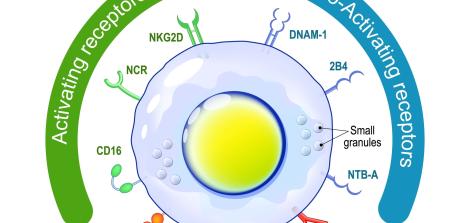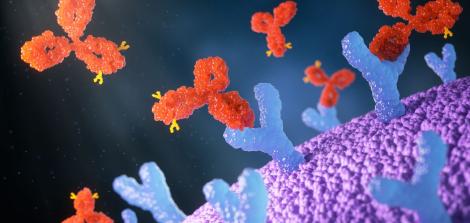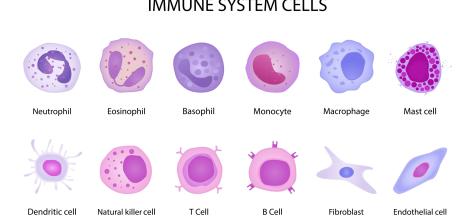Violent Behavior? It May Be Related to the Gut Microbiota
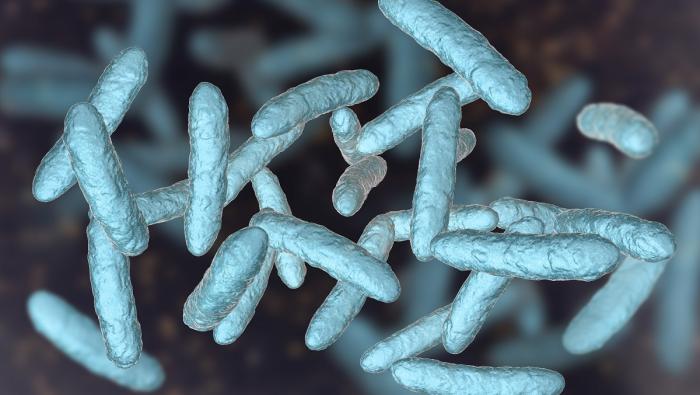
What makes people and animals behave violently? Studies have shown that violent behavior, scientifically termed "aggression", is controlled by multiple factors - genetic, neurological and hormonal, as well as social and environmental factors.
Although aggressive behavior has been studied extensively, the scientific understanding of the relationship between aggression and certain biological processes is still lacking. Top researchers are currently investigating the relationship between several factors and aggressive behavior; one of the most interesting factors is the Microbiota - the population of bacteria that live in one’s gut. There is growing evidence that gut bacterial populations can greatly influence the host's physiology, gut-brain axis interactions, and social behavior - but the exact way in which this happens has not yet been fully explored.
A groundbreaking study led by Prof. Omry Koren from the Azrieli Faculty of Medicine at Bar-Ilan University demonstrated that alterations in the gut microbiota may increase violent behavior, While feeding the gut with specific bacteria may moderate violent behavior.
Well, at least when it comes to flies.
The Fruit Fly: A Preferable Animal Model
The fruit fly, or Drosophila Melanogaster, has been used as an animal model for over 100 years. This means that its genome has been fully sequenced, and that its stages of development, its cell biology, and its developmental biology across various life cycle stages - are well-known to scientists.
Aggression in fruit flies has also been thoroughly studied and the neurological mechanisms leading to violent behavior in flies have been identified and mapped. What "triggers" violent behavior in flies are mainly pheromones - volatile chemicals that flies detect through their sense of smell.
Due to the relatively simple microbiota composition in fruit flies, and scientists' ability to manipulate it and examine the effects of a single bacterial species on the behavior of flies, this organism has become a favorite in the research of the gut-brain microbiota axis and social behavior.
The Research Question:
Do alterations in the gut microbiota of fruit flies affect their aggressive behavior? And critically, can exposure to certain bacteria moderate aggressive behavior?
A groundbreaking study conducted at the Azrieli Faculty of Medicine at the University of Bar Ilan sought to find answers to these microbiota research questions.
Previous studies in fruit flies have shown that exposure to antibiotics significantly affects their mating preferences, which entirely corresponded with changes in the levels of cVA, a male hormone that encourages courtship and aggressive behavior in fruit flies. based on these finding, researchers expected to confirm this correlation.
Through a series of manipulations, scientists investigated how specific alterations in the microbiome composition of fruit flies affected relevant pheromones and receptors, as well as their aggressive behavior.
To measure the changes in the expression of aggression in flies, four experimental groups were examined:
- Flies that did not receive any treatment, which served as the control group (cmy-WT);
- Flies that received antibiotic treatment to eliminate their gut microbiome (ABX);
- Flies fed with the Lactobacillus brevis bacterium only (L. brevis);
- Flies fed with the Lactobacillus plantarum bacterium only (L. plantarum).
First, the researchers examined how the composition of the microbiota in flies affects the levels of the cVA and (Z)-9-Tricosene (T-9) pheromones in their bodies. The researchers discovered a high correspondence between microbiome populations, aggressive behavior, and the levels of these two pheromones: the levels of these pheromones in flies that received antibiotics to eliminate their intestinal bacteria (Group 2) were on average twice as high as the levels in the control group (Group 1).
Previous studies have shown that under certain conditions, as part of the olfactory mechanism of fruit flies, different genes are expressed for receptors that help the fly "smell" different pheromones. For this reason, the researchers examined the effect of the microbiota on the level of three pheromone receptors known to be associated with aggression – OR67d and OR83b, which are cVA receptors, and GR32a, which is a T-9 receptor.
Indeed, the researchers discovered that antibiotic treatment also significantly increases the level of two of the receptors, compared with the control group. They also discovered that adding the bacterium Lactobacillus brevis (Group 3) to the flies' diet led to a decrease in the level of these receptors to levels that were similar to those of the control group.
In the group of flies that received the Lactobacillus plantarum supplement (Group 4), the researchers discovered fewer expressions of aggression as well as lower pheromone levels, even though the receptor levels remained high.
The Results: Less Violent Flies
Reduced pheromone levels in flies fed with bacteria led to the expression of fewer aggression-related physiological characteristics. Antibiotic treatment, increased the number of aggressive behavioral expressions by almost 150%, while feeding with one of the bacterial species, L. brevis or L. plantarum, reduced the expressions of aggression both in flies treated with antibiotics, as well as in the control group.
This study is one of the first to show the relationship between antibiotics, aggressive behavior, and associated physiological characteristics in flies. Understanding this relationship can shed light on gut-brain axis interactions and may allow us in the future to better understand aggressive, as well as other types of behavior, in humans as well as facilitate the development of future drugs and treatments that can be personalized to individual patients and their unique microbiota composition.
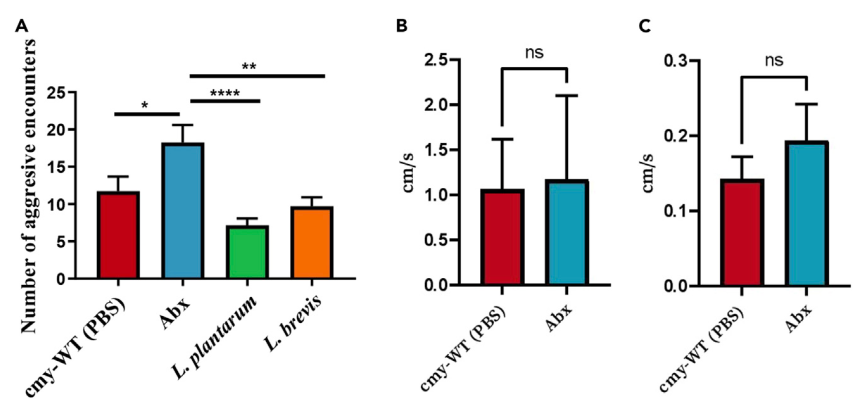 Expressions of violence in flies from the four experimental groups - in blue - flies that received antibiotics
Expressions of violence in flies from the four experimental groups - in blue - flies that received antibiotics
The Bottom Line:
In this groundbreaking study, which used powerful computerized tools and advanced technologies to map vast bacterial populations, the researchers tested the hypothesis that alterations in the composition of the gut microbiota of fruit flies would affect aggressive male behavior, and conducted several experiments that examined these alterations from several angles. This accurate experimental setup allowed the researchers for the first time to identify physiological mechanisms and understand the order by which they worked.
Additional research of the microbiota could help elucidate our understanding of the relationship between bacteria and host behavior, and demonstrate exactly how different bacterial species affect the behavior of animals and humans. A mouse model study, the next stage of experimentation on the road to humans, is currently being conducted in Prof. Omry Koren's laboratory.
Last Updated Date : 13/03/2023





